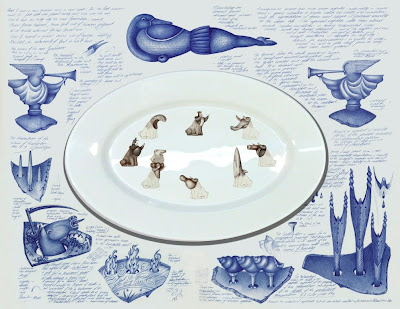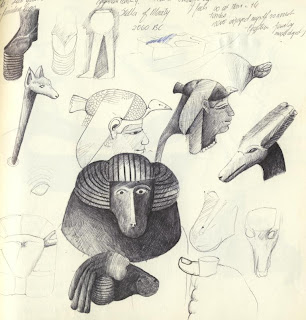
Long walk to Paradise, Digital Print of Ballpoint pen drawings on acid free paper. Collection of the Artist (1/5) and Carl Landsberg (artist proof)
Drawing with Ballpoint pens.
My drawings have never featured on this blog, especially my passion for drawing with ballpoint pens. This post therefore captures a wide selection of drawings made over the past 25 years. I started drawing with ballpoint pens during my final year of study towards a BAFA in Ceramic Sclulpture - drawing in a bound book for obvious reason explained below. The refinement of my technique; with the emphasis on capturing the three dimensional forms and shapes for ceramic sculptures, was consolidated on a study trip abroad, way back in 1984. These drawings (the last entries on this post) were for my masters obtained in 1986. However its was only recently that I introduced colour, emulating tattoos, placing far greater emphasis on surface decoration (written on the body) than ever before. Although drawings do feature on the blog they more than often support the development of the work. Numerous visitors to the blog expressed and interest in the drawings - what follows is the best of my drawings over 25 years (the drawings of the recently posted pierced rats appear separately under the label attached to this entry) or follow the link provided.
Long Road to Paradise (drawings above)
The drawing above formed part of a curated exhibition to celebrate our young democracy. The tile is derived from Nelson Mandela's book, the long Road to Freedom. The art works had to illustrate the tile of the book, each artist had to conclude the title provided, The long road....... The individual drawings were scanned into a computer, together with a photograph of the platter and the composition was styled using Photoshop. Digital printing on acid free paper ensures that ballpoint pen drawings are preserved (it fades completely with time if exposed to sunlight).
Most complex drawings I have ever done
The first four drawings below are the most complex I have ever made and demonstrates my technique and skill. Further down the post are drawings of different styles developed in support of the ceramic sculptures over the years. Also included is ballpoint pen studies of organic objects, artefacts and renderings showcasing the development of the drawing technique and style. I trust you will find them interesting.

The Minotaur /Pope. see explication below.
The drawing above forms part of a work of art digitally printed on acid free paper - complete work below.
Pope/ Minotaur (ballpoint pen drawing above).
One of my favourite ballpoint pen drawings is the Minotaur featured above. Especially the sculptural qualities; the stylization of the forms and shapes, including the small added details, all of which enhances the Minotaur's gestalt. The ribbon of his apron (tied at the front) serves numerous symbolic functions, its represents a scissor, a symbol for circumcision, it also alludes to his genitals, which is indicative of the Catholic Church's lack of action against the abuse of children amongst their clergy. His hands and arms are outstretched above his head, to take the shape of horns and compliments his outstretched legs, firmly on the ground; a stance of defiance, arrogance and stubbornness. He wears a butchers apron, associated with slaughtering of animals; indicative of the popes stance on homosexuality (gays) and the use of condoms in an aids stricken world.

The Pansy, Final Drawing for a series of ceramic sculptures. (2007-2009)















The drawing above is the first to incorporate a range colours. With reference to tattoos, the surface decoration added another dimension to the expressive function of the ceramic sculptures. The focus on surface decoration is in direct response to the notion of written on the body (referring to tattoos and other forms of body modification). The contemporary cultural representation and signifying practices of tattoos associated with surface decoration on ceramics.

Magic Carpet, Final drawing for Ceramic sculpture based on the myth of Lady Godiva.
The drawing above is arguably one of the more complex drawings I have ever made with ballpoint pens. The use of colour was introduced only three years ago for the first time - inspired by tattoos, as mentioned above, it seemed the logical direction to go. The addition of colour adds another dimension to the drawing technique. I guess it is the stylization of three dimensional forms captured in the drawings, embracing the modeling and moulding techniques of the sculptural process that make them already special. Adding colour and surface decoration, a taboo instilled in me as a Fine Art Student, makes it that much more unique. My recent fascination with surface decoration is very obvious in these drawings. In the drawing above, it is the subtle use of colour that intrigued me. Especially the light grey tones of her body and dress, offset with red ink lipstick decoration on her legs, contrasting sharply with the gaudiness of the butterfly. The detail in the waves should make for interesting decals should I pursue this direction.
Bulls, Bullies, Minotaurs and their victims.
The following set of drawing go back a long time, it started in 1989 and I am still fascinated with the theme. Some of which remain drawings, even though they would make great ideas for ceramic sculptures. The thought of doing an artist book, incorporating them into another expressive format is an obvious one.

Big-shots, Image of war moguls. preparatory drawing for ceramic sculpture dealing with war and mainly violence against woman .

The Bigot, Drawing part of the Bully series; see details below.Ballpoint pen drawing (2007) Original set of drawing completed in Paris.

Big Jaw, Ballpoint pen drawing (2007) Original set of drawing completed in Paris.
The Bully
A Series of drawings based on "bulling" in all shapes and sizes, characters and forces prevalent in society today. This is one of my favourite drawings and images ever created. I was fascinated with Picasso's etchings, paintings, and ceramics based on the Minotaur and the horse. The Minotaur is associated with the labyrinth, it represents death (man's unconquerable enemy) and or our worst enemy. That which haunts us and torments us on a daily basis. These creatures represent those that provoke intolerance and bring out our worst fears!.
Where there is a bully, there must be a victim, find below a reoccurring theme, the swan as a figurehead, vulnerable, yet ready to explode.


Preparatory drawings for image above.

Final drawing for a ceramic sculpture (untitled). Three months spent at the Cite, Paris. Research travel grant.

Final drawing for a ceramic sculpture, Fate two. Three months spent at the Cite, Paris. Research travel grant.

Final Drawing for the porcelain sculpture, The Swine. (1990). Three months spent at the Cite, Paris. Research travel grant.
Drawings for headrest inspired Ceramic Sculptures.
The headrests were interesting as objects, both formally and stylistically, especially the interesting positive and negative shapes and forms. However it is the metaphor of the dream machines (headrests) that provided the vehicle for personal expression, a direct response to all the violence and crime experienced and endured during this period; the late eighties and nineties (living in Yeoville JHB). Here are a few drawings from this series.

Preparatory Drawings (1994-5) for a new series of hand built Ceramic Sculptures.
The role of drawing in the development of sculptural ideas.
Based on headrests (dream machines), with exciting positive and negative spaces, these artefacts provided a mythical and symbolic inspiration for the hand built ceramic sculptures I made during the nineties. The above gestural drawings provide an excellent example of the role of rendering of this kind in the creative process - developing your ideas. The forms and shapes and finally the proportions, including the scale of the work, can be predetermined. Being able to capture the idea on paper, provides an excellent opportunity to be inventive sculpturally - however it simplifies the modelling and moulding phase of the sculpting process. I always photo-stat the work to the required scale, taking into account the shrinkage - it therefore speeds up the modelling process (see studio shot further below).

Night howler, Final Drawing for a porcelain sculpture (1994),
Inspired by African Headrests and myths and narrative on the origin of death. A series of Ceramic sculptures developed to address the violence experienced in South Africa, as a resident in Yeoville in the 1990's.

Final drawing for a Sculpture, inspired by African headrests, Dream machines 1990.

A drawing of an Artefact (1990). I really love this drawing, especially the faces of the monkeys and the composition; the positive and negative shapes.
Drawings of organic objects and artifacts.
Since my travels abroad in 1984, artefacts were the initial inspiration in the sculptural process; they were the departure point in developing innovative and creative forms and shapes. Inspired initially by the evocative quality of literary sources, the artefacts formed a symbolic vehicle from which to start the inventive sculptural process in each of the ceramic statements, in this case wooden carved headrests, pipes and other African indigenous works of art.

Observation studies. Rosendal 1989.
It is always good to draw from nature. It keeps the eyes trained to observe and render. Very necessary skills for a an inventive sculptor. I love drawing and having a bound sketch book, allows one to draw on both sides of the page and to keeps a systematic diary/record of the development of your ideas. It also protects the drawings - loose pages always fold and bend with disastrous consequences.

Ceramic Studio at the Technikon Wiwatersrand (1989). where I taught, with the enlarged photos-tats of drawings on the wall, to aid the sculpting process.
Drawings for the final body of work (Masters of Fine Art 1984-1986)
The drawings that follow are mainly done during my travels as a masters student in 1984. The drawings are captured in abound book, drawings of artefacts and inspirational works of art made during visits to major museums all over the world. From Hong Kong to Paris and Italy, Germany, England and New York. Three months of observation, reflection and inspiration. During the trip, artefacts and sculptures formed the inspiration for the final body of work submitted towards my Masters of Fine Art. The images below are a very small selection of the best drawings I made as a student. The drawings for The Horse and rider, perfectly illustrate to what extent the artefacts influenced the look and feel of the final ceramic statements.













.jpg)
.jpg)



0 Comments:
Post a Comment